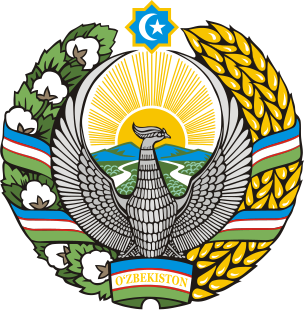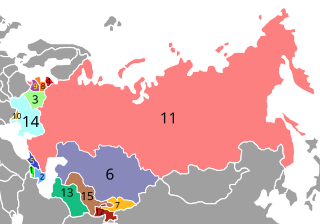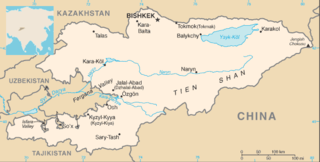Related Research Articles

Central Asia is a subregion of Asia that stretches from the Caspian Sea in the west to China and Mongolia in the east, and from Afghanistan and Iran in the south to Russia in the north. The region consists of the former Soviet republics of Kazakhstan, Kyrgyzstan, Tajikistan, Turkmenistan, and Uzbekistan. It is also colloquially referred to as "The -Stans" as the countries all have names ending with the Persian suffix "-stan", meaning "land of".

Uzbekistan joined the Commonwealth of Independent States in December 1991. However, it is opposed to reintegration and withdrew from the CIS collective security arrangement in 1999. Since that time, Uzbekistan has participated in the CIS peacekeeping force in Tajikistan and in United Nations-organized groups to help resolve the Tajik and Afghan conflicts, both of which it sees as posing threats to its own stability. Uzbekistan is an active supporter of U.S. efforts against worldwide terrorism and joined the coalitions which have dealt with both Afghanistan and Iraq. It is a member of the United Nations, the Euro-Atlantic Partnership Council, Partnership for Peace, and the Organization for Security and Cooperation in Europe (OSCE). It belongs to the Organisation of Islamic Cooperation (OIC) and the Economic Cooperation Organization, which comprises 7 Central Asian countries: Pakistan, Uzbekistan, Kazakhstan, Turkmenistan, Afghanistan, Kyrgyzstan and Tajikistan. It is a founding member of and remains involved in the Central Asian Union, formed with Kazakhstan and Kyrgyzstan, joined in March 1998 by Tajikistan.

The Euro-Asia Division (ESD) of Seventh-day Adventists is a sub-entity of the General Conference of Seventh-day Adventists, which oversees the Church's work in the nations of Armenia, Belarus, Georgia, Kazakhstan, Kyrgyzstan, Moldova, Russia, Tajikistan, Turkmenistan, Ukraine and Uzbekistan. Its headquarters is in Moscow, Russia. The Division membership as of June 30, 2021 is 102,829.

The post-Soviet states, also known as the former Soviet Union (FSU), the former Soviet Republics and in Russia as the near abroad, are the 15 sovereign states that were union republics of the Soviet Union; that emerged and re-emerged from the Soviet Union following its dissolution in 1991.

The Catholic Church in Kazakhstan is part of the worldwide Catholic Church, under the spiritual leadership of the pope in Rome.

Architecture of Central Asia refers to the architectural styles of the numerous societies that have occupied Central Asia throughout history. These styles include Timurid architecture of the 14th and 15th centuries, Islamic-influenced Persian architecture and 20th century Soviet Modernism. Central Asia is an area that encompasses land from the Xinjiang Province of China in the East to the Caspian Sea in the West. The region is made up of the countries of Kazakhstan, Uzbekistan, Tajikistan, Kyrgyzstan, and Turkmenistan. The influence of Timurid Architecture can be recognised in numerous sites in Kazakhstan and Uzbekistan, whilst the influence of Persian Architecture is seen frequently in Uzbekistan and in some examples in Turkmenistan. Examples of Soviet Architecture can be found in Uzbekistan, Kazakhstan, Tajikistan and Kyrgyzstan.
The Central Asian Games (CAG) is an international multi-sport event organised by the Central Asian Olympic Committee (CAOC) and held every two years since 1995 among athletes from Central Asian countries and territories of the Olympic Council of Asia (OCA), especially formerly members of the Union of Soviet Socialist Republics.

The Central Asian Union (CAU), later called the Central Asian Economic Union, was an intergovernmental organisation for economic integration between the Central Asian post-Soviet republics of Kazakhstan, Kyrgyzstan and Uzbekistan between 1994 and 2004. Tajikistan joined the Union in 1996 as an observer. Several proposals to restore the Union have been put forward since its dissolution.

The Roman Catholic Diocese of Karaganda is a Latin diocese of the Catholic Church, suffragan in the ecclesiastical province of the Metropolitan of Mary Most Holy in Astana, yet remains subject to the missionary Congregation for the Evangelization of Peoples.

The Evangelical Lutheran Church in Russia, Ukraine, Kazakhstan and Central Asia, also known as the Evangelical Lutheran Church in Russia and the Other States (ELCROS), is a Lutheran denomination that itself comprises seven regional Lutheran denominations in Belarus, Georgia, Kazakhstan, Kyrgyzstan, Russia, Ukraine, and Uzbekistan as well as individual congregations in Azerbaijan, Tajikistan, and Turkmenistan. Established in its current form in 1999, ELCROS currently has about 24,050 members in more than 400 congregations within its jurisdiction.
Armenians in Central Asian states: Uzbekistan, Kazakhstan, Kyrgyzstan, Tajikistan and Turkmenistan, were mainly settled there during the Soviet era for various reasons.
The Apostolic Administration of Kyrgyzstan is a Roman Catholic Apostolic Administration for the Catholics of Kyrgyzstan.
The Apostolic Administration of Uzbekistan is a Roman Catholic Apostolic Administration for the Catholics of Uzbekistan.

The Kazakhstan–Turkmenistan border is 413 kilometres (257 mi) in length and runs from the Caspian Sea to the tripoint with Uzbekistan. It is the shortest international boundary of both states.

The Turkmenistan–Uzbekistan border is the border between the countries of the Republic of Turkmenistan and the Republic of Uzbekistan. At 1,793 km (1,114m), it is Turkmenistan's longest border and Uzbekistan's second longest. The border runs from the tripoint with Kazakhstan to the tripoint with Afghanistan.

The Kazakhstan–Kyrgyzstan border is 1,212 km (753 mi) and runs from the tripoint with Uzbekistan to the tripoint with China. Bishkek, the Kyrgyz capital, is situated just 16 km (10m) to the south of this boundary, and Almaty is situated just 29 km (18.4m) to the north of it.

The Apostolic Administration of Kazakhstan and Central Asia is an Apostolic Administration and is exempt, i.e. directly subject to the Holy See, that extends its jurisdiction over all the Eastern Catholic faithful of the Byzantine Rite who live in Kazakhstan, Kyrgyzstan, Tajikistan, Turkmenistan and Uzbekistan.
The Judo Union of Asia (JUA) is the governing body of judo in Asia. It is one of the five continental confederations making up the International Judo Federation (IJF). JUA was formed in 1956 in Tokyo (Japan), with Chinese Taipei, Cambodia, Indonesia, Japan, South Korea, Philippines and Thailand being the founder members. JUA has headquarters in Kuwait and consists of 39 member federations.
The Catholic Bishops' Conference of Kazakhstan was the episcopal conference of Kazakhstan, that operated from 2003 until 2022. It consisted of Archdiocese, two dioceses, and apostolic administration.
References
- ↑ "Central Asian bishops form new regional conference". Vatican News. Retrieved 2022-06-18.
- ↑ "Bishops' Conference of Central Asia". Gcatholic.org. Retrieved 2022-06-18.